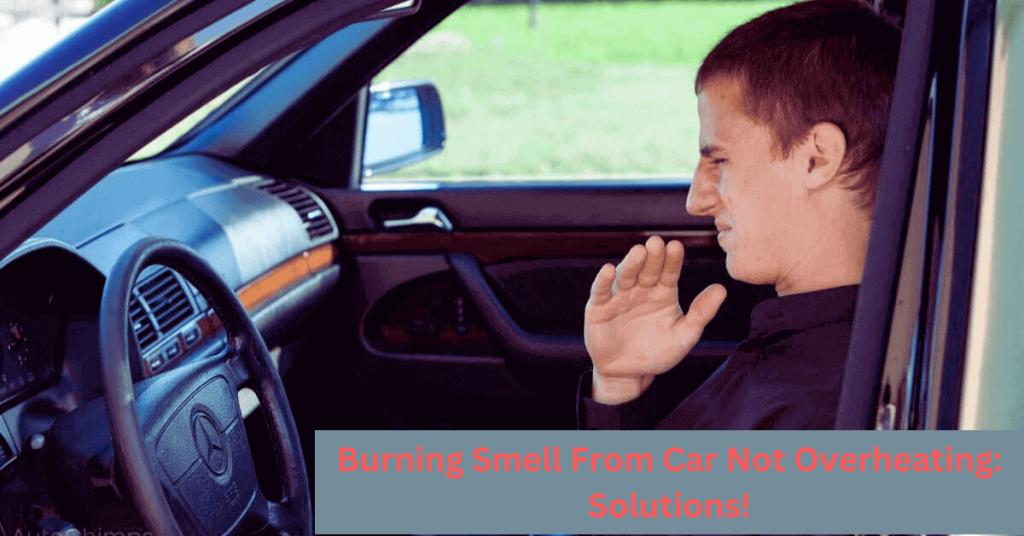
It could be anything in your car that is worn out or broken and emits unusual or offensive odors. If there is a burning smell in your car but not the engine is overheating. Then, resolve it right away because it poses a risk to one’s health.
Whatever the problem, you’re breathing something you shouldn’t. Remember that a burning smell coming from a car does not always indicate that the vehicle is overheating.
The reason for this anomaly depends mainly on the location and type of smell.
Several factors, such as a burned-out electrical fuse, an overheating air conditioning compressor, or worn-out brake pads, can make your car smell like it’s burning.
In this post, we’ll go further into the many burning scents that a car could emit and what each one means.
Then we’ll address some queries about the burning smells coming from cars but not overheating.
Main Causes & Solutions Of Burning Smell From Car But Not Overheating!
There are many reasons for the burning smell in a car, including worn brake pads and a slipping clutch. Which emits a burning odor when fluid spills onto hot engine parts.
Or the heated exhaust The fumes from a damaged or leaking exhaust can emit a burning smell. Sometimes, lack of proper maintenance or reckless driving causes these issues.
We’ve listed several possible causes of a burning smell from a car but not overheating.
- Brake pads
- Clutch
- Electrical problems
- Oil leaks
- Defective AC compressor
- Faulty Alternator
- Damaged Wheel Bearing
- Clogged Heater Core
- Rodents in the Engine Compartments
It’s critical to locate the smell’s source and deal with it soon to prevent further harm or potential issues.
Brake Pads
A burning smell coming from the brakes without the engine overheating can occur when the brake pads are worn down. And the friction material on the pads has worn away, revealing the metal backing plate.
When the driver applies the brakes, the metal backing plate rubs against the rotor, producing a burning smell. In addition, if the brake pads are contaminated with oil or other substances, they can also produce a burning smell when they come into contact with the rotor.
Another cause of a burning smell from a brake pad that is not overheating is if the brake pad is not properly releasing. It could be due to a malfunctioning calliper or a brake pad that is not well adjusted. & Causing the pad to drag against the rotor and produce heat and smell.
It’s important to have your brake pads checked regularly and replaced as necessary to avoid this type of problem. A professional mechanic can inspect the brake pads, rotors, and calipers and make any necessary repairs or adjustments to ensure the proper function and safety of the vehicle.
Clutch make burning smell from car not overheating
A burning smell coming from the clutch can occur when the clutch is worn or damaged and is not well engaging or disengaging the transmission. When the clutch is worn, the friction material on the clutch disc may wear away, revealing the metal backing plate. When the driver shifts gears, the metal backing plate rubs against the flywheel, producing a burning smell.
Additionally, if the clutch is not adjusted well, it may cause the clutch to slip. Which can generate heat and produce a burning smell.
Another possible cause of a burning smell from the clutch without overheating is the presence of oil or other contaminants on the clutch disc, which can cause it to slip and generate heat and a burning smell.
It’s important to have the clutch inspected regularly, particularly if you notice a burning smell or if the vehicle is having trouble shifting gears. And make any necessary repairs or adjustments to ensure the proper function and safety of the vehicle.
Electrical Problems make burning smell from car not overheating
Electrical problems can produce a burning smell in a car without overheating due to a short circuit or malfunctioning electrical components.
- Short Circuit: If a short circuit occurs in the electrical system, it can cause the wires to overheat and produce a burning smell.
- Alternator: If the alternator is failing or malfunctioning, it can produce a burning smell as the alternator may put extra load on the battery and wiring, causing them to overheat.
- Battery: A malfunctioning battery can produce a burning smell due to overheating caused by overcharging or a short circuit within the battery itself.
- Wiring: Damaged or frayed wires can also produce a burning smell when they come into contact with other hot components or when they overheat due to poor connections.
Oil Leaks make burning smell from car not overheating
An oil leak can cause a burning smell in a car without causing the car to overheat because oil leaks onto or near the exhaust system or hot engine parts, which can create a burning smell.
The burning smell can happen even if the oil is not in contact with the engine’s cooling system, which is responsible for regulating the engine’s temperature. Additionally, if the oil is leaking in small amounts and not affecting the oil pressure, the engine will not overheat, but the smell will persist.
To prevent further harm to the engine and other components of the car, it is crucial to fix an oil leak as fast as possible.
Defective AC compressor
A defective AC compressor can cause a burning smell in a car without causing the car to overheat. Because the AC compressor is located near the front of the vehicle. So, when it fails, it can leak oil or refrigerant onto the engine or exhaust system.
The oil or refrigerant can create a burning smell when it comes into contact with hot parts of the engine or exhaust system. If the compressor is not working well, it may create a burning smell when it’s trying to compress the refrigerant.
Faulty Alternator
A faulty alternator can produce a burning smell if it’s overworking to keep the battery charged. It could also cause the alternator’s bearings to fail, which can produce a burning smell.
An alternator is always in operation since it powers electrical accessories and charges the battery in your car. And because of this, it is vulnerable to overheating and flawed development.
It’s important to address a problem with the alternator soon, as it can cause damage to the engine or other parts of the car and can also lead to a dead battery.
Damaged Wheel Bearing
Damaged wheel bearings can cause a burning smell in a car but not overheating because the wheel bearings stay near the tires and wheels. When they fail, they can produce heat and friction, resulting in a burning smell. This can happen if the bearings become worn or damaged indeed.
It is necessary to visually inspect the wheel bearing and listen for any odd noises when driving to detect a damaged wheel bearing. When turning, a damaged wheel bearing will make a loud grinding or growling sound.
A mechanic will have to disassemble the wheel hub to check the wheel bearing condition and replace it if needed. As damaged wheel bearings can cause further damage to the wheel hub, suspension, and even the transmission.
Clogged Heater Core make burning smell from car not overheating
A clogged heater core can cause a burning smell in a car without causing the car to overheat because the heater core is separate from the engine’s cooling system, which is responsible for regulating the engine’s temperature.
When the heater core becomes clogged, the coolant that flows through it can overheat and create a burning smell. But this overheating is not directly affecting the engine’s cooling system, and therefore the engine temperature doesn’t rise.
However, the coolant may become too hot and create a burning smell. But it’s not hot enough to cause the engine to overheat. Additionally, if the heater core is clogged, the coolant may not be circulating well and may not be able to dissipate heat. Which causes the coolant to become too hot and create a burning smell indeed.
Rodents in the Engine Compartments
Rodents, such as rats and mice, can cause a burning smell in car engine compartments by gnawing on wires and other components. This can create short circuits, which can generate heat and produce a burning smell.
However, this does not cause overheating, as the damage is usually localized and does not impede the overall functioning of the engine’s cooling system.
In addition, the engine’s cooling system dissipates heat, and as long as it is functioning well, it should be able to keep the engine from overheating.
More burning smell about the car.
Final Thought
Finally, it’s not technically prohibited to drive while getting a burning smell from car but not overheating. But if you haven’t determined what’s causing the odour. It’s advisable to err on the side of caution and decide against it indeed. While some fundamental causes are simple to fix, others are more difficult and can develop into dangerous situations very fast.
So if you notice a burning smell in your car, it’s recommended that you have it inspected by a professional mechanic as soon as possible. In order to identify the source of the problem and take appropriate measures to fix it.
FAQs
If my car smells like burned rubber, can I still drive it?
A burnt rubber odor coming from an automobile is frequently an indication that the brakes or tires have been overheated. However, the most common cause of overheating in cars is a sliding or malfunctioning clutch. If you notice this odor while applying the clutch at the time. Then wait for the car to cool before trying again.
Is the burning smell a result of low oil?
A strong burning oil smell is a very typical issue with engines that are short on oil indeed. When you begin to notice an oily smell while driving. Then it’s usually a very strong indication that it’s time for an oil change.
Is a car’s smell of smoke ever-present?
While the stench from the smoke can persist for some time and can infiltrate hard surfaces, clothing, and even the car’s air conditioning system. However, if you detect a burning smell inside your automobile then stop right away. Also, get out, maintain a safe distance from it, and use caution until you can locate the source.
How long does the stench of a burned clutch last?
4000 RPM or so at the bite-point for about 1.5 seconds. There is a strong burning or smoke smell indeed. After approximately two minutes, then the smell disappears.
Can a clogged air filter produce a burning smell?
These impurities may enter your air filter, clog it, and then enter the blower, overheating it. In order to boot, this may allow dirt and dust to enter the heat exchanger and heat it up. However, by periodically changing your filter, you may largely avoid both of these burning smells.
Related Why Is My Car Leaking Water? Learn The Most Common Reasons!







Leave a Reply